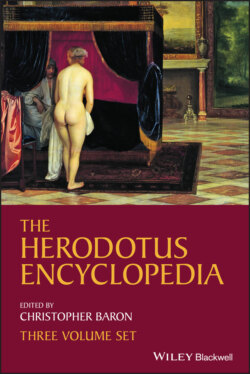Читать книгу The Herodotus Encyclopedia - Группа авторов - Страница 302
AMASIS ( Ἄμασις, ὁ) king of Egypt
ОглавлениеTYPHAINE HAZIZA
Université de Caen Normandie
Amasis (Ahmose II, ruled 570–526 BCE) is the last pharaoh whom Herodotus presents in his Egyptian LOGOS (Book 2). It is also Amasis who receives the most developed treatment from Herodotus: not less than eleven chapters are devoted to his reign (2.172–82), not counting those which recall his seizure of power from the legitimate pharaoh APRIES, who is disavowed by the Egyptian soldiers (2.162–63).
There may be multiple explanations for Herodotus’ interest in the second‐to‐last pharaoh of the 26th (Saite) Dynasty, but the principal reason rests no doubt on the very strong links which tied Amasis to the Greeks. Beyond rich DEDICATIONS in the Greek world (DELPHI, CYRENE, LINDUS, and SAMOS), relations of FRIENDSHIP and alliance—in particular, through a MARRIAGE with the Cyrenean LADICE—and the use of Greeks in the military (even being used as bodyguards for the king, in preference to Egyptians: 2.154.3), Amasis was especially distinguished in the eyes of the Greeks by his actions in connection with NAUCRATIS. Indeed, even if (contrary to what we gather from Herodotus: “he gave Naucratis as a POLIS to settle in,” 2.178) Amasis did not, properly speaking, “found” the EMPORION of Naucratis, he was its principal organizer, in conceding to the Greeks a certain number of privileges —in particular religious (the HELLENION)—in order to facilitate an operation which aimed above all at better control of the activity of Greek merchants in the DELTA.
In addition to this figure of a “philhellenic” king (2.178), other images, sometimes at first sight contradictory, coexist in Herodotus’ long biographical notice. One can note those of the philosopher‐king, legislator, or builder; but also, what is perhaps more original, the intimate (not to say satirical) portrait which is drawn of this ruler “of popular origin” (2.172) across several anecdotes (cf. 2.162, 172, 173, 174, 181). This could account simultaneously for an Egyptian tradition—this image being concordant with that found in texts of demotic literature—and a Greek re‐interpretation of Egyptian history, in particular, of the prosperous reign of Amasis.
SEE ALSO: Egypt; Humor; Mercenaries; Nitetis; Psammenitus; Sais; Trade
